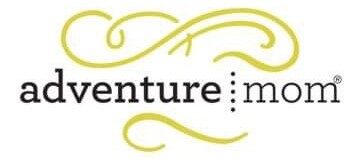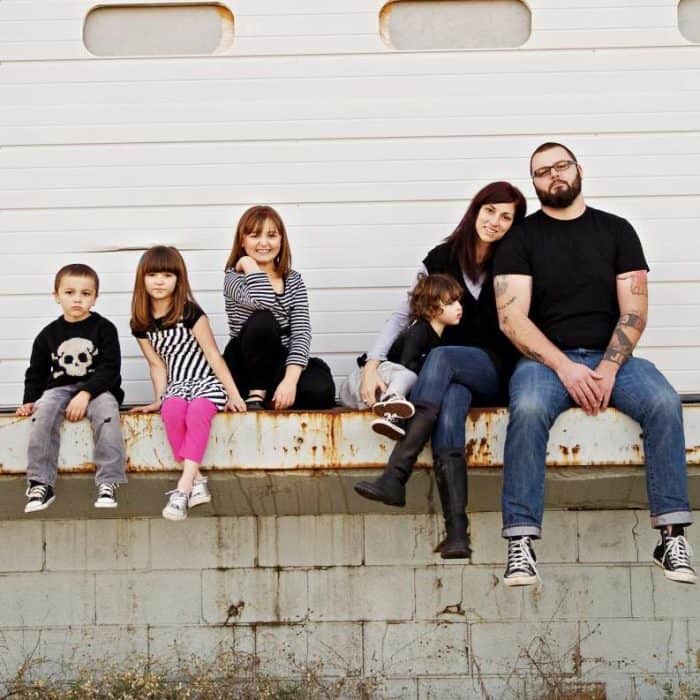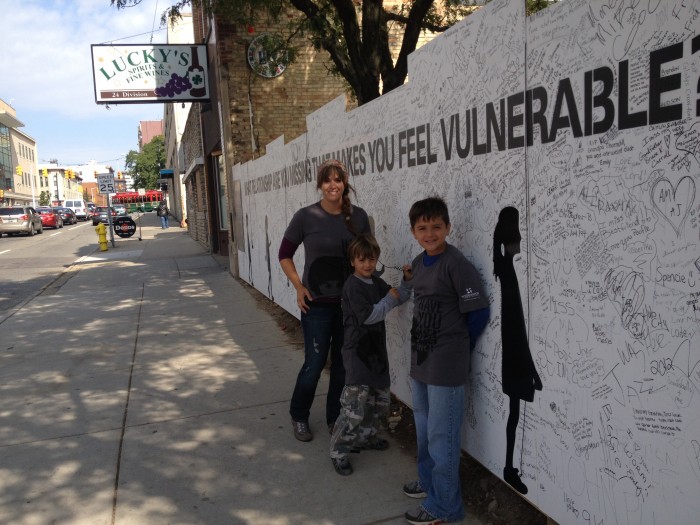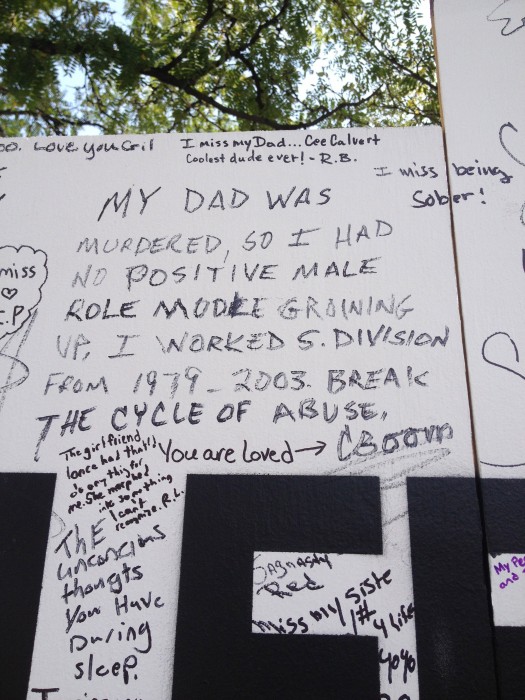I want to introduce you to Andy Soper. Andy and his wife Marcy are the heart and soul behind The Manasseh Project. Conversations with them about their vision for changing the lives of woman have really impacted me. I am proud to call them friends and they continue to inspire and challenge me to care about people who can be forgotten.
This past fall my boys and I got to volunteer a shift at one of the stations for The Manasseh Project during Art Prize. The three week long event was a family affair and sacrifice for the Soper family. Their kids were also serving along side their parents helping pass out balloons and water at various stations. I love that they model giving back to the community.
Our station encouraged people walking by to share what relationships in their life have left them feeling vulnerable.
Some of the responses were so heartbreaking. You can learn more about how The Manasseh Project really brought awareness of Human Trafficking to the forefront this year at Art Prize here.
Marcy says she is just Andy’s biggest cheerleader but I can personally tell you that she is so much more than that! I have personally seen that she has risen to action to reach out to girls in need by being a listening ear and also by helping with physical needs the girls have as they rebuild their lives.
I asked Andy to share about The Manasseh Project because I think we all need to be reminded that we can do something to help make someone else’s life better. So here we go!
What caused you to start The Manasseh Project?
I had seen victims of trafficking at Wedgwood Christian Services for most of the time I worked in residential care. More often than not, they were victimized by parents or by a boyfriend. Many were substance abuse kids who were looking to get sober.
For whatever reason, I wasn’t really moved by their stories. They were just clients. I was just a staff member. I didn’t get emotionally involved.
However, when a 13-year-old girl I worked with was lured away from us by an older boy at school and then trafficked by a woman in downtown GR, my callus broke. As a team, we looked for her whenever we could, knowing she was being hurt.
Through the entire ordeal, I noticed a lack of services for her and a lack of education in our area about what happens to children who slip through the cracks of our systems. They’re chum in the water for perpetrators.
We made it our goal to educate professionals, do excellent prevention work with youth, and advocate for victims in our area.
What’s the story behind the name?
Early in our search for funding, I was filling out an application for a local bar that gave out money for start-ups. When I arrived at the ‘name of organization’ section, I was completely at a loss. We hadn’t thought that far ahead. Naming hadn’t come into consciousness yet, but naming is powerful.
I’d been reading through my Dad’s Bible that week. My father passed away when I was a kid and a friend of his had dropped off his Bible along with a number of other items that they’d had for 25 years. Reading through my Dad’s Bible was a way to understand him. What had he underlined? What words had he sketched in the margins? I’d just finished documenting his work in Genesis. He’d underlined the words ‘Manasseh’ and ‘Ephraim.’ These were Joseph’s sons. After abuse, neglect, forced labor and (probable) sexual assault, Joseph looked at his firstborn and named him, Manasseh – ‘God has made me forget all my trouble and all my father’s house.’
For the children we work with, a future often seems improbable, at best. However, our hope is that, like Joseph, they will ‘forget’, grow through, and thrive in spite of their abuse.
Why should we care about human trafficking?
I confess that I can honestly say it is difficult for us to care about it. The majority of the slavery in the world today is labor trafficking. When we talk with people about sexual exploitation, they can easily shift it away saying, ‘I’ve never bought someone for sex, so it isn’t my problem.’ This may be true. However, we all have products and food directly tied to slavery – chocolate, coffee, electronics, jewelry – that make us comfortable and beautiful. We are inextricably tied to the humanity on the other side of this supply chain.
Booker T. Washington said, ‘You can’t hold a man down without staying down with him.’ As we grow comfortable and apathetic, we miss the reality that we are consuming others and, indeed, consuming ourselves.
Human Trafficking is simply a symptom. It is the tragic culmination of dozens of violent root causes – poverty, sexual abuse, cultural violence, oppression of women, obsessive consumption, etc. When we promote the violence of unjust consumption, we ignore the plight of thousands, ruining us all in the process.
What is currently being done to stop trafficking domestically and internationally?
Hundreds of NGOs work daily to heal victims, prosecute traffickers, and prevent future abuses. Several European countries have excellent laws pertaining to prosecuting human trafficking. New shelters spring up each day, each one devoted to providing a healing environment, practical skill, education, and peace.
Action is being taken in the US as well. While we fall short legislatively (including our most recent legislation), we’ve seen a dramatic rise in our level of awareness and action. However, there remains a sticking notion that this isn’t happening in our communities, so we raise money for overseas organizations and neglect kids in our neighborhoods. While I support the efforts for overseas aid, the reality that trafficked domestic children have far fewer opportunities for help than foreign-born victims.
Currently, many states are looking to place Safe Harbor Acts in their legal cannon. Safe Harbor protects children under 18 from being charged with prostitution, gives civil recourse for victims to recoup money from their traffickers, and can lead to having criminal charges removed from their records. New York, Ohio, Illinois, Florida and a handful of other states already have this legislation in place. Michigan is currently drafting their bill. I cannot encourage you enough to reach out to your state senators and representatives encouraging them to protect children.
What can we do?
No answer we can give will be practical. In fact, they are largely impractical. Solving this issue involves deconstructing our myths about consumption and sexuality. First, from a cultural perspective on sexual exploitation, we have to begin to answer for the media and cultural attitudes that oppress and objectify women. Advertisements make sport of women, turning them into consumable products. Products are de-contextualized. Their value lies, not in the product inherently, but in the purchasers use. If women are simply objects to be taken in, then their value lies in their consumer, not in the woman herself.
Tearing down these cultural structures is difficult. More specifically, they are difficult to root out in our own minds. Men can be hardwired to consume and women can be programmed to vie for the opportunity to be consumed. We need to look no further than an Axe Body Spray commercial for evidence.
This issue speaks to the demand for degrading commercial sex, but it also speaks to prevention work. 90% of trafficking work is preventative effort. Professionals and volunteers alike do this work in K-12 schools around the country. Educating students about personal value, pouring positivity into their minds and actions, and correcting unhealthy cultural attitudes. However, as is the case in so many districts, bodies are sparse. To end human trafficking and/or exploitation of any kind in your neighborhood, mentor a child. Be the positive adult who can recognize signs of distress or success in a child’s life. Know their ticks, their affect, their peccadillos. Cries for help are often silent, but written in the actions and facial expressions of a hurting child.
From a labor trafficking perspective, our lot is equally difficult. We’ve got to become responsible for our buying habits. Begin to explore the supply chains of the products you buy using tools from free2work.org. When you discover that your favorite foods or products come from companies who disregard human life, stop buying. Or, if you absolutely love the product, love the company by letting them know how much you enjoy their products, but can’t support them because of their standards regarding slave or unfair child labor. Change happens when we love each other enough to confront unhealthy or abusive actions or attitudes.
It is easy to say, ‘If slavery pops up in everything, then I can’t change things. It is inevitable that I’ll buy something with abusive connections.’ I would encourage you to understand that ‘inevitability’ is the language of the empire. Empires exist to promote their own growth and sustainability at any cost. Injustice is not inevitable, it is permitted. Rooting it out is difficult and disruptive, but necessary.
Dietrich Bonhoeffer, a revolutionary pastor during World War II, said,
‘We are not simply to bandage the wounds of victims beneath the wheels of injustice, we are to drive a spoke into the wheel itself.’ Pity for victims does nothing. More victims will grow to replace the one’s we’ve patched up. But if we disrupt and destroy what crushes – oppression, poverty, substance abuse, rampant and abusive power, war, and apathy – then we prevent the necessity of bloody bandages.
Thanks again to Andy for sharing with us today.
The Manasseh Project offers several services to the community. They educate first responders, youth, faith based/ social organizations, provide victim advocacy and has recently opened the first Michigan safe house for victims.
***Andy guest speaks about education and awareness of human trafficking all of the country. You can contact him at manasseh@wedgwood.org
You can learn more about volunteering and supporting The Manasseh Project from their website.





Thank you for this amazing story and sharing about this project!
Thanks so much for sharing this post about Wedgwood’s Manasseh Project! We appreciate you helping to spread the word about this important program and for taking the time to volunteer with us last fall! Did you know we also recently opened a shelter for human trafficking victims as well? There’s an awesome video about it here, where you can learn about it a little bit more https://www.youtube.com/watch?v=TNIuqrjlBkY
Thanks again for your support – we hope to continue to find ways for families like yours to stay involved in making a difference for the lives of these girls in the future!
Elyse Putnam
Communications Manager
Wedgwood Christian Services